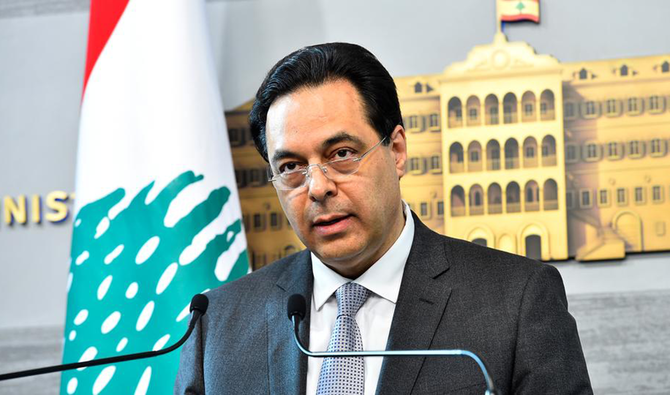
BEIRUT: Lebanon’s caretaker Prime Minister Hassan Diab has ruled out the possibility of reinstating the government he led until its resignation on August 10, 2020. In a statement issued on Wednesday, Diab said: “Defining the powers of a caretaker government and the role of the resigned Cabinet requires a constitutional interpretation, which is the exclusive right of parliament.” Diab was, indirectly, responding to an invitation issued by Hezbollah Secretary-General Hassan Nasrallah a few days ago to reactivate the resigned government, as President Michel Aoun and Prime Minister-designate Saad Hariri remain in deadlock over the formation of a new government for the crises-stricken country. Diab continued his statement by saying that eight months after his cabinet resigned in the aftermath of August’s devastating Beirut Port explosion, “efforts have not succeeded in forming a government that would save Lebanon from its current crisis. Things have even gone beyond logic and the government’s formation has become a national crisis, which has exacerbated the suffering of the Lebanese. Forming a new government remains a priority.”
The formation of a new government remains fraught with difficulty, however, given the vast political gulf between the two sides. Aoun is reportedly insisting that he and his allies be granted a third of cabinet portfolios, effectively handing them the power of veto over any major government decision. His demand has the indirect support of Hezbollah, which is calling for a “techno-political government,” while other parties are backing a government consisting of independent ministers with no party or bloc enjoying a ‘blocking third.’ Aoun met with the ambassadors of France and Saudi Arabia on Tuesday to try and clarify his position. The Lebanese media described those meetings as “an attempt to be granted clearance and to hold Saad Hariri responsible for the delay.” However, the Saudi ambassador’s statement from the presidential palace about respecting Lebanon’s sovereignty, not interfering in others’ affairs and committing to the Taif Agreement suggested that attempt failed.
By MOHAMMED ABU ZAID — arabnews.com — CAIRO: The Arab League has said it is ready to intervene to solve the crisis …

By BY DAVID WOOD, JACOB BOSWALL -- foreignpolicy.com -- Of the 40-strong staff at the cleaning company he works for, Velvet Services, Hamadeh is the only Lebanese among mostly Bangladeshis. “Honestly, I know [Lebanese] people who really need work, but none of them work as cleaners,” Hamadeh said. “I know that they wouldn’t do this kind of work.” Nivine Zarzour, Hamadeh’s boss, has tried to hire more Lebanese, whom she can pay with lira instead of increasingly scarce—and expensive—U.S. dollars. But she has failed to attract Lebanese recruits, which she traces to a deep-seated cultural stigma. “The main reason is not the salary,” Zarzour said. “We [Lebanese] always had foreign cleaners and helpers.” For decades, Lebanon has relied on migrant workers—recruited from such countries as Bangladesh, Ethiopia, and the Philippines—to clean houses, operate gas pumps, and stock supermarket shelves. The largest sector for migrant labor is live-in domestic work, which accounted for 80 percent of migrant labor permits issued last year, according to statistics obtained from the Ministry of Labor.
Demand for foreign workers has propped up Lebanon’s notorious kafala system, which activists decry as exposing workers to modern-day indentured servitude. Originating in the Gulf, kafala ties a migrant worker’s residency in Lebanon to their employer, or kafeel (sponsor). Kafala workers rarely enjoy basic guarantees of rest days, set working hours, or freedom to switch jobs. Without a doubt, Lebanon’s economic crisis has shaken the kafala system. Records from the Ministry of Labor indicate that new migrant worker arrivals dropped by 75 percent from 2019 to 2020. Employers are increasingly unable to pay staff, and foreign workers are now less inclined to gamble on Lebanon. As demand plummets, the number of local recruitment agencies has shrunk from around 600 to 250 companies, according to industry sources. Yet all signs indicate that kafala will reemerge, battered but unbroken, from Lebanon’s financial implosion. Like Hamadeh, some Lebanese might take on shift work in taboo fields like cleaning to make ends meet. But for the most part, it is still only foreigners who appear willing to work in many such positions.
BEIRUT (Reuters) – Saudi Arabia’s ambassador called on Lebanese political parties to quickly form a new government that will have to pull …
Khazen History


Historical Feature:
Churches and Monasteries of the Khazen family

St. Anthony of Padua Church in Ballouneh
Mar Abda Church in Bakaatit Kanaan
Saint Michael Church in Bkaatouta
Saint Therese Church in Qolayaat
Saint Simeon Stylites (مار سمعان العامودي) Church In Ajaltoun
Virgin Mary Church (سيدة المعونات) in Sheilé
Assumption of Mary Church in Ballouneh
1 - The sword of the Maronite Prince
2 - LES KHAZEN CONSULS DE FRANCE
3 - LES MARONITES & LES KHAZEN
4 - LES MAAN & LES KHAZEN
5 - ORIGINE DE LA FAMILLE
Population Movements to Keserwan - The Khazens and The Maans
ما جاء عن الثورة في المقاطعة الكسروانية
ثورة أهالي كسروان على المشايخ الخوازنة وأسبابها
Origins of the "Prince of Maronite" Title
Growing diversity: the Khazin sheiks and the clergy in the first decades of the 18th century
Historical Members:
Barbar Beik El Khazen [English]
Patriach Toubia Kaiss El Khazen(Biography & Life Part1 Part2) (Arabic)
Patriach Youssef Dargham El Khazen (Cont'd)
Cheikh Bishara Jafal El Khazen
Patriarch Youssef Raji El Khazen
The Martyrs Cheikh Philippe & Cheikh Farid El Khazen
Cheikh Nawfal El Khazen (Consul De France)
Cheikh Hossun El Khazen (Consul De France)
Cheikh Abou-Nawfal El Khazen (Consul De France)
Cheikh Francis Abee Nader & his son Yousef
Cheikh Abou-Kanso El Khazen (Consul De France)
Cheikh Abou Nader El Khazen
Cheikh Chafic El Khazen
Cheikh Keserwan El Khazen
Cheikh Serhal El Khazen [English]
Cheikh Rafiq El Khazen [English]
Cheikh Hanna El Khazen
Cheikha Arzi El Khazen
Marie El Khazen